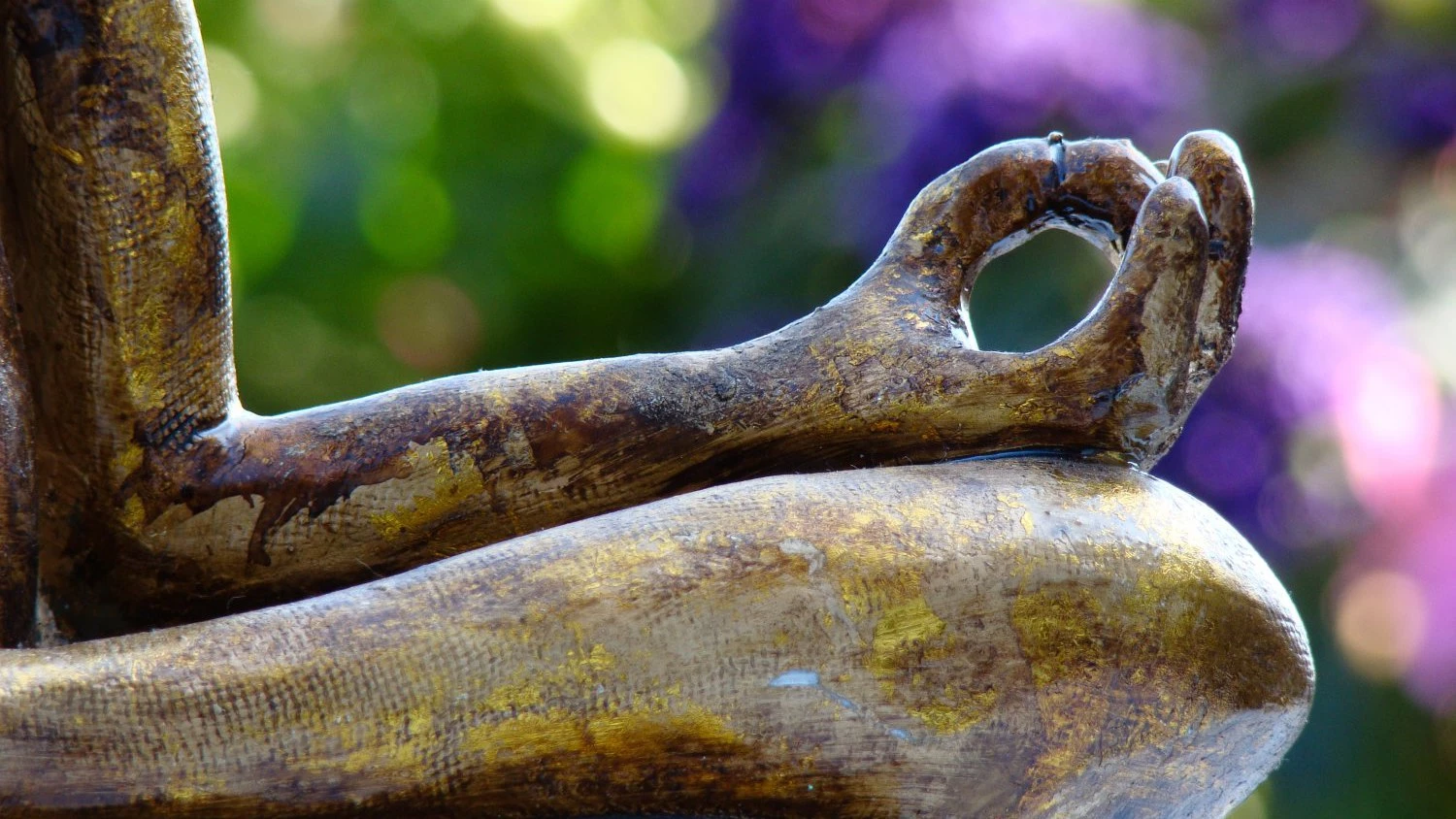The Fifth Niyama: Ishvara Pranidhana – Surrender to the Lord

The fifth and last of the niyamas (personal observances) from Patanjali’s Yoga Sutras is Ishvara pranidhana: “surrender to the Lord.” There have been centuries of debate among scholars about what exactly Patanjali meant by Ishvara. This Sanskrit word literally translates as Lord, but other interpretations include a personal god, the true Self, pure awareness, pure consciousness or unchanging reality.
“Lord” can be a loaded term for us Westerners. The word is used interchangeably with “God” in the Old and New Testament of the Bible, and consequently has come to mean the same thing. Some of us might believe strongly in the omniscient, omnipotent and omnipresent God or Allah of the Christian, Jewish and Muslim faiths. Others may pray to many Hindu deities. Some may favor the more agnostic approach of the Buddha. Still others may adamantly believe that God does not exist.
But wait: with all this talk of God, is yoga a religion? Recently a California appeals court was called upon to explore this very question when the parents of two students in the Encinitas school district claimed their religious freedom was being violated by the school’s yoga program. The court ultimately decided that no, yoga is not inherently religious.
Despite the court’s ruling, there’s actually no unequivocal answer to the question. Unlike most religions, yoga does lack a specific ideology, dogma, and belief system. But it has roots in Vedism, a religion from which Hinduism and Buddhism also evolved. Some yoga practitioners seek deeply spiritual experiences, such as samadhi (union with the Divine). A yoga practice might involve kirtan (call-and-response chanting in Sanskrit), bhakti (devotional practices such as mantra meditation, chanting and prayer), or puja (ritual).
If you go to a yoga class in the United States, you might unroll your mat in front of an altar sprinkled with statues of Ganesha (a Hindu god in the form of an elephant) and Nataraja (a depiction of the Hindu god Shiva as a dancer). Maybe then you’ll listen to a dharma talk on the Buddhist concept of basic goodness before chanting to Lakshmi (the Hindu goddess of wealth, generosity and abundance). Perhaps later in the class you’ll attempt Hanumanasana (a full split, named in honor of the Hindu monkey god Hanuman). And you might do all of this while wearing a t-shirt emblazoned with Om (a sacred sound and spiritual symbol used as a mantra in Hinduism, Jainism, and Buddhism).
So it’s pretty clear that the yoga we practice today has religious roots and influences. It’s also undeniable that in the nearly 2,000 years since Patanjali wrote the Yoga Sutras, the practice of yoga has changed enormously.
Today, there are many ways people choose to practice yoga. Some yogic paths are very spiritual, and might even be considered religious; others are completely devoid of spirituality; and still others incorporate some mild spiritual elements in a wholly secular, non-theistic way. The practitioner has the freedom to choose a way in which to practice that is relevant and meaningful to him or her, and to set an intention that resonates in his or her heart, mind and body.
Given this evolution, how can we now interpret Patanjali’s instruction to “surrender to the Lord?” Rather than attempt to give you a clear-cut answer (because, quite honestly, I don’t have one), I invite you to explore the meaning of Patanjali’s words for you, in the context of your life, replete with your experiences, beliefs, values, questions and uncertainties. By exploring the meaning of Patanjali’s words on a personal level, you will come to a deeper understanding of yourself, your purpose, and your vision of how you fit into this vast interconnected universe.
The practice of yoga is rich with opportunities for self-exploration, and seeking to understand Ishvara pranidhana is no exception. What kind of images, reactions or emotions does the mention of “Lord” elicit in you? Do you have a strong, unwavering belief that there is a higher power, or do you struggle with uncertainty and doubt about the existence of God? How about the mention of “surrender”? Do you balk at the idea of surrendering or bowing to any being or force or energy? And if so, why?
You might then examine how these beliefs, ideas and values that you’ve discovered affect the way you conduct yourself in your daily life; the ways in which you treat other beings, both large and small; and your relationship with nature and the Earth. Exploring the answers to these and so many other questions will give you invaluable insight into yourself.
When I dig into this personal introspection, Ishvara pranidhana helps me to remember that the universe does not revolve around me; that I don’t have all the answers, nor do I need to; that there are forces outside of myself that I will never understand; that try as I might to figure things out there will always be a bigger picture that’s beyond my comprehension. And that’s okay. When I surrender the need to know, I move that much closer to uncovering my true nature: that part of me that doesn’t intellectualize, analyze, critique, or overthink; the part that is unchanging, undying, everlasting and eternal.
 Christine Malossi, RYT is based in New York City, where she offers a mindful, alignment-focused Vinyasa practice that cultivates balance, awareness and equanimity. In addition to teaching private clients and group classes at studios throughout Manhattan, she also teaches at the Spencer Cox Center for Health at Mount Sinai Hospital’s Institute for Advanced Medicine whereshe designs a practice specifically tailored to patients diagnosed with HIV and other chronic illnesses. Christine is honored to be teaching yoga and to have the opportunity to pass on to others the joy and freedom that she has found in her own practice. Find her at www.christinemalossi.com or on Facebook.
Christine Malossi, RYT is based in New York City, where she offers a mindful, alignment-focused Vinyasa practice that cultivates balance, awareness and equanimity. In addition to teaching private clients and group classes at studios throughout Manhattan, she also teaches at the Spencer Cox Center for Health at Mount Sinai Hospital’s Institute for Advanced Medicine whereshe designs a practice specifically tailored to patients diagnosed with HIV and other chronic illnesses. Christine is honored to be teaching yoga and to have the opportunity to pass on to others the joy and freedom that she has found in her own practice. Find her at www.christinemalossi.com or on Facebook.



